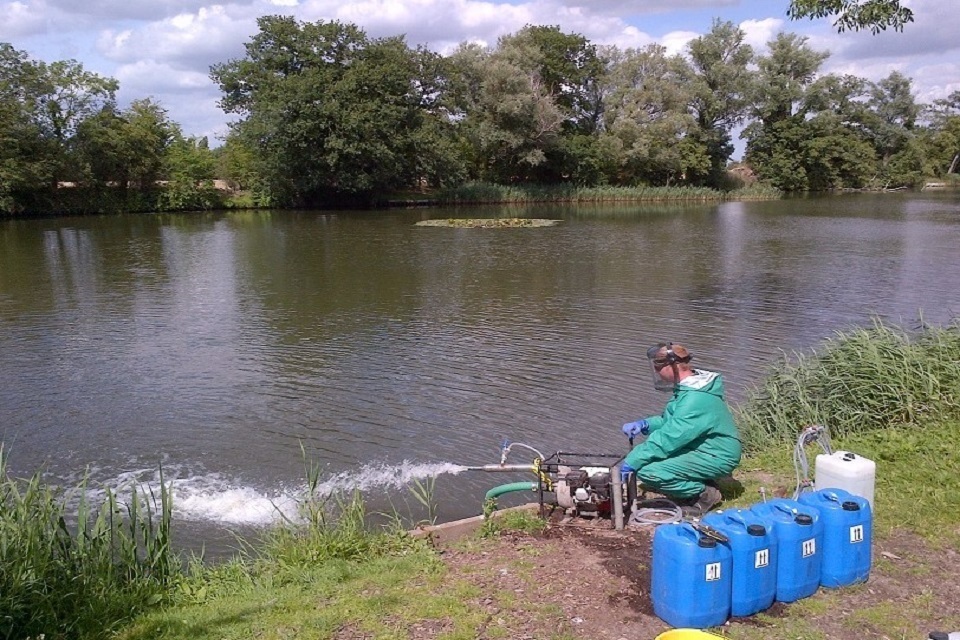
Extreme heat: Environment Agency calls on public to help protect fish
Published By GOV.UK [English], Mon, Jul 18, 2022 6:12 AM
With a rare Red Extreme Heat Warning issued by the Met Office for Monday 18 July and Tuesday 19 July, the Environment Agency is calling on anglers, fisheries owners and the public to help them protect vulnerable fish stocks.
Extreme weather, including continuous hot temperatures and thunderstorms, can be highly dangerous for fish and can cause a range of problems, particularly for more susceptible species like salmon and pike. Hot and sunny weather typically triggers algal blooms, which can reduce dissolved oxygen levels in our waters leading to fish becoming distressed and, in some cases, dying.
In the last week, Environment Agency officers have helped protect thousands of fish in Worcestershire and Essex thanks to anglers, fisheries owners and the public reporting concerns to our Incident Hotline on 0800 80 70 60 or alerting the fishery owner or angling club.
Fish should never be moved to other waters by the public because they are unlikely to survive and could spread disease or invasive species by accident, which can damage fish and other wildlife in the area.
Heidi Stone, Fisheries Partnerships Manager at the Environment Agency, said:
Environment Agency teams are working hard to mitigate the impacts of recent high temperatures and are monitoring the situation closely when it comes to protecting fish at risk.
We aim to respond to reports of fish in distress as quickly as possible. Help from the public goes a long way which is why we provide free advice to all on how to protect fish during hot weather.
Last week in Worcestershire, the Environment Agency deployed several aeration pumps to an angling club’s fishery after dissolved oxygen levels fell to around 15 per cent. This rapid response saved thousands of vulnerable fish and averted a significant fish mortality. At another fishery in Basildon, Essex, Environment Agency officers deployed aerators after the report of 1,000 dead fish at a fishery owned by the borough council. Dissolved oxygen levels have since recovered due to prompt reporting and a rapid response from EA fisheries officers.
Environment Agency incident response work includes deploying aeration equipment or hydrogen peroxide to restore dissolved oxygen levels, providing expert advice to angling clubs and anglers, and occasionally, as a last resort, relocating fish. All of this work is funded by fishing licence income – and provides a vital life line to fisheries when they most need it.
Many angling clubs and fisheries carry out effective practices to help manage and mitigate the impacts of continued hot temperatures on fisheries, but a list of ten top tips are available to guide people on how to protect vital stocks and prevent fish deaths where possible.
Anglers can also help vulnerable fish stocks by minimising use of bait, taking care when playing, landing and releasing large or sensitive fish, such as pike, barbel, trout and salmon, as well as avoiding taking photos of fish out of water to avoid further oxygen loss.
Anyone who sees fish in distress should contact the Environment Agency on 0800 80 70 60.
Further information
Our work is funded by rod licence income. Every penny we receive is reinvested to fund vital work to protect and improve England’s fisheries such as enforcing the right laws; providing an emergency response; ensuring healthy fish stocks in a good quality environment; and providing a sustainable future for angling.
Signs that a fish is in distress include appearing lethargic and/or unresponsive, sometimes close to the bank, tight shoaling and obvious gasping at the surface, and signs of infection or fungus.
Further information on how anglers can help fish in distress by:
Take particular care when playing, landing and releasing barbel during warm weather
Avoid fishing for larger fish or sensitive species if the water temperature exceeds 19°C by mid-morning. (Clubs may choose to update their social media accounts with daily updates)
Minimise your use of ground-bait. As it decomposes, this can further reduce the amount of dissolved oxygen in the water. Fish feeding on ground-bait may have a greater oxygen need, so take longer to recover from being caught.
Unhook fish in the water if possible and only take them out of the water for unhooking if absolutely necessary (in rivers hold them facing upstream to recover)
Avoid taking photos. Where absolutely necessary, take photos in the water - keeping a fish in the air, even for a few seconds, can greatly reduce its chances of surviving after capture and going on to spawn successfully.
Press release distributed by Media Pigeon on behalf of GOV.UK, on Jul 18, 2022. For more information subscribe and follow